Aug 13, 2024 – Farm Work
Good morning. A new day has dawned at Dubuk Jungto Retreat Center. Though it’s still hot and humid, autumn seems to be approaching as chestnuts have started falling from the trees.

After finishing the morning practice and meditation, Sunim began working with the Dharma teachers at 6 AM. First, they surveyed the fields, paddies, and greenhouses to determine where to cut the grass. Some elderly villagers were already out working in their fields and paddies.

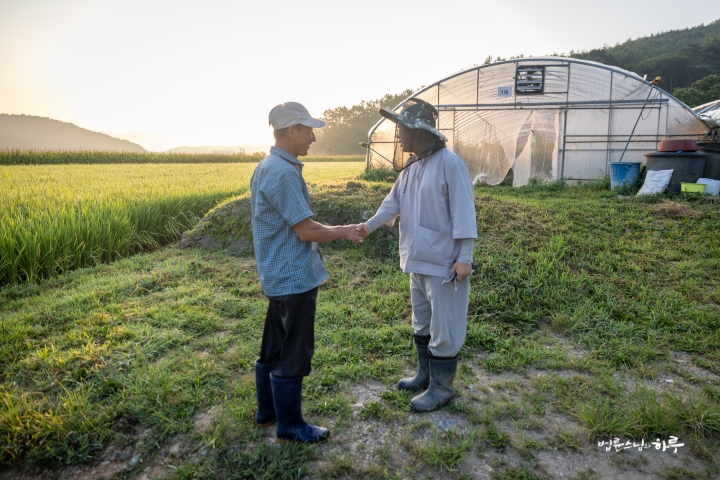
“Sunim, it’s been a while.”
“Yes, have you been well?”
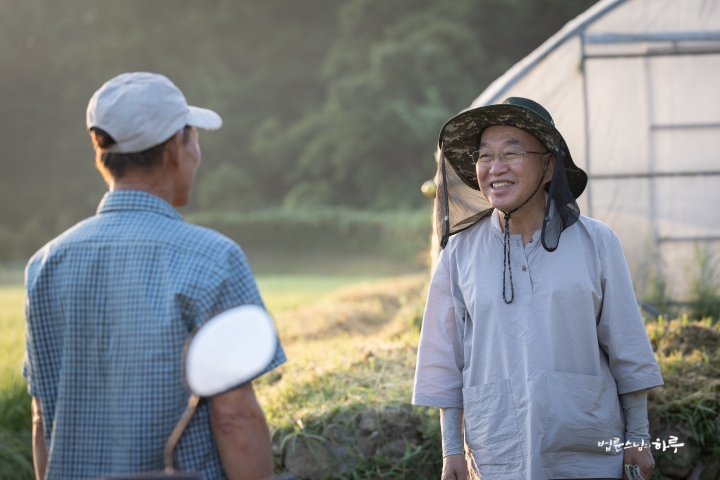
“Yes. Are you in good health too, Sunim?”
“Yes. I heard that the village chief called a few days ago saying the grass had grown too much. Our entire community was on a two-week summer retreat, so we couldn’t tend to the farm work. That’s why I came out to cut the grass along the roads and paddy ridges.”
After exchanging warm greetings, they began cutting the grass.
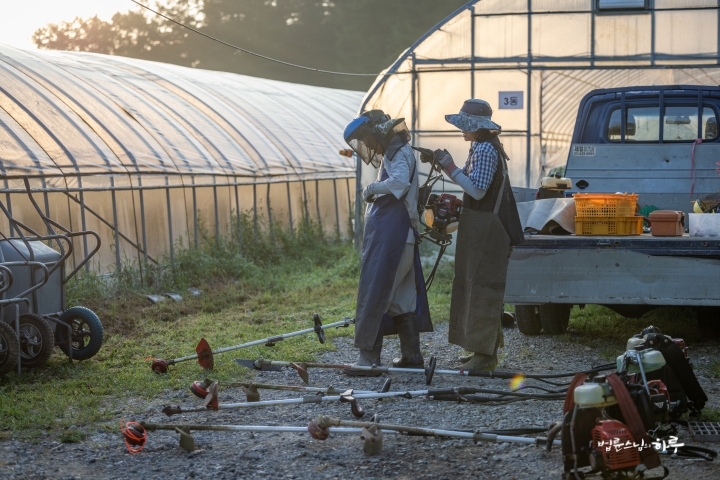
First, they went to three greenhouses where sesame was growing. A lot of weeds had grown between the sesame plants.

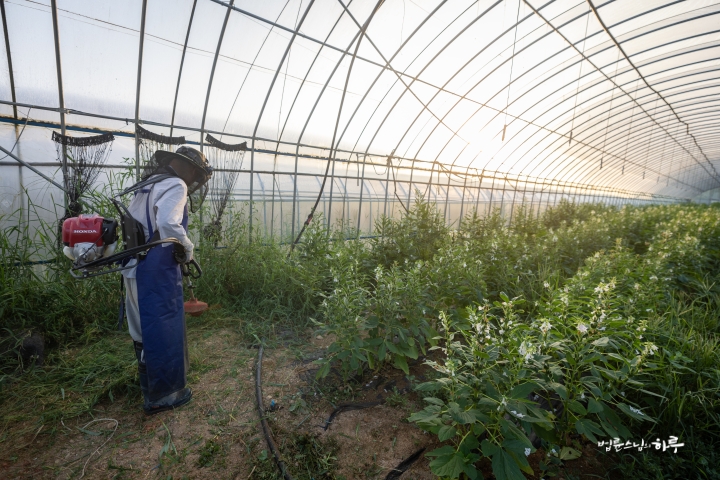
Sunim, who had been cutting the thick grass at the entrance, came out.
“The trimmer line is too long, so it might damage the crops while cutting the grass. I should start by cutting the grass on the outside first.”
Sunim carefully cut the grass around the farm shed and greenhouses.

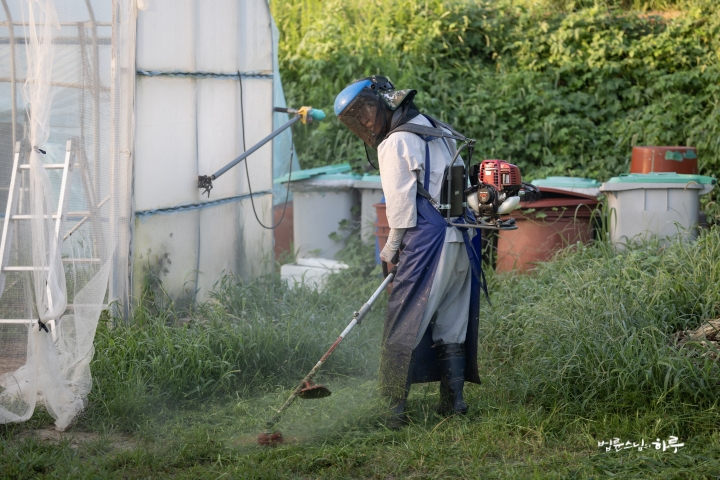
When the line had shortened sufficiently, he went back inside the greenhouse and started cutting the grass. As the sun grew stronger, the inside of the greenhouse quickly became hot.

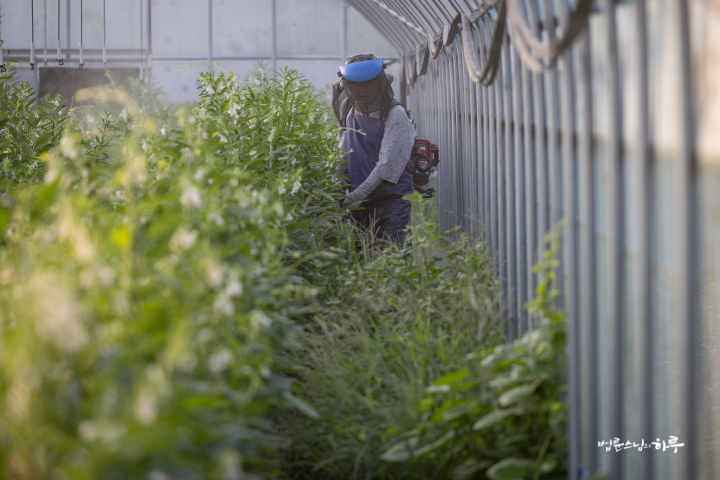

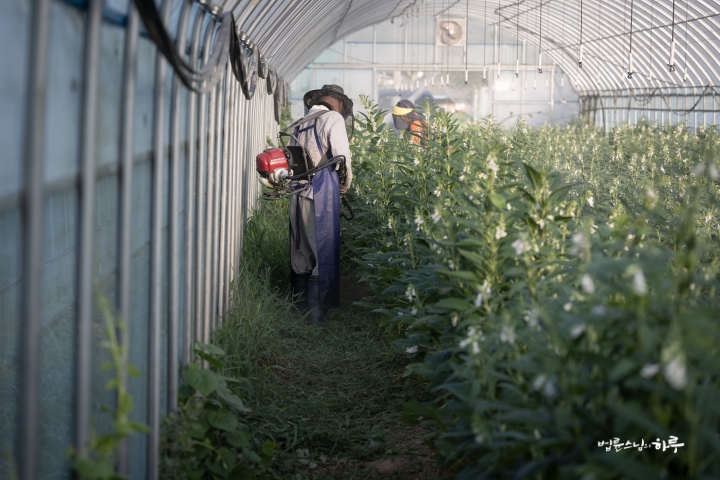
The grass was also thick behind the greenhouse.
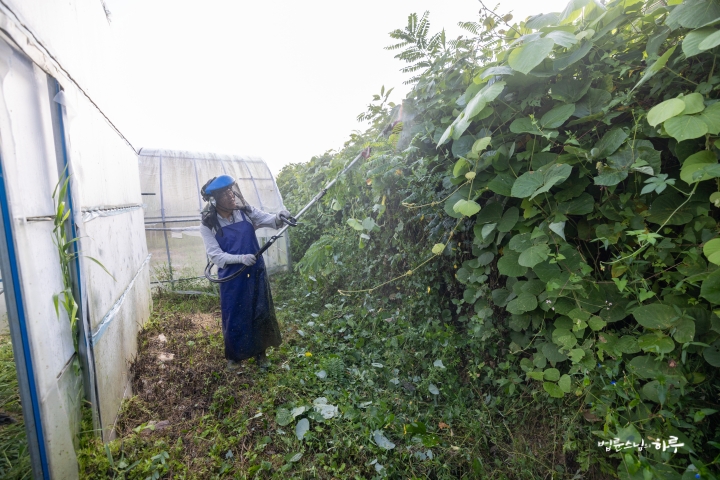
As Sunim repeatedly raised and lowered the trimmer blade to cut the grass, a Haengja asked in a concerned voice, “Sunim, are you feeling alright?”
“When I’m working, I don’t even notice if I’m in pain.”

After cutting all the grass inside the greenhouse, he went outside. Starting from areas far from the greenhouse, he cut the grass and worked his way back, trimming the grass close to the greenhouse as well. A Haengja followed behind, using a sickle to cut the grass growing right up against the greenhouse.
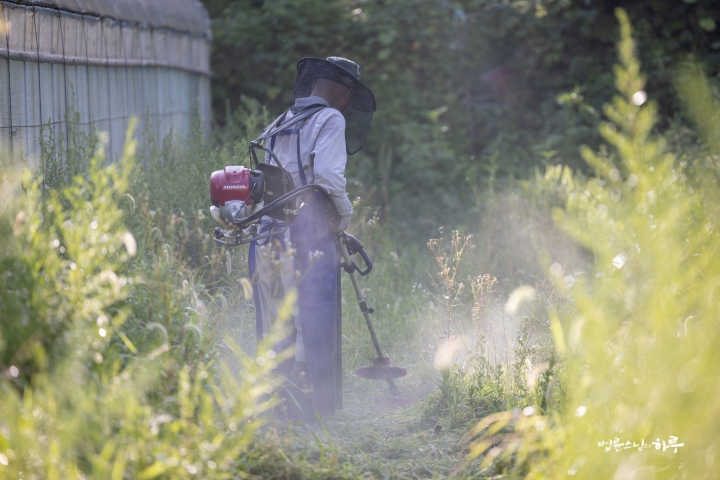
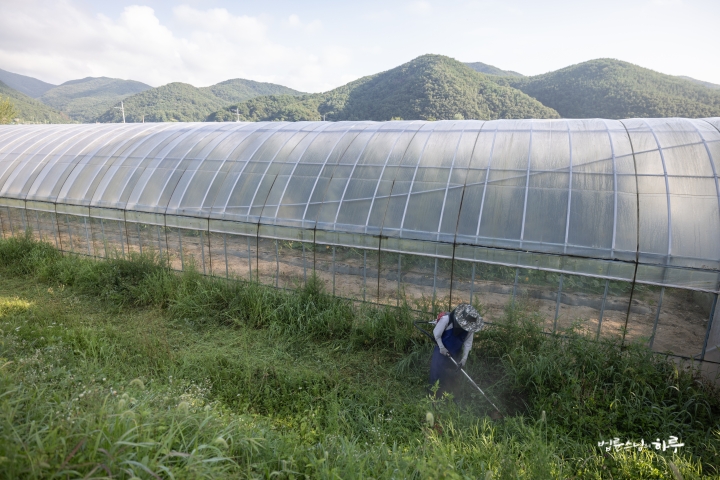
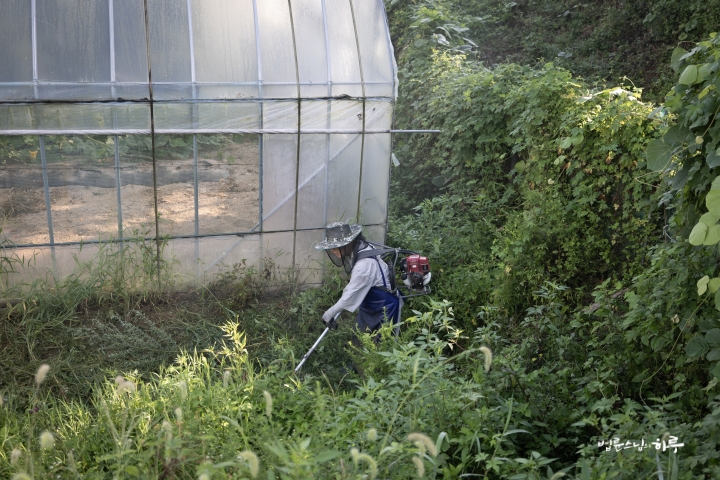
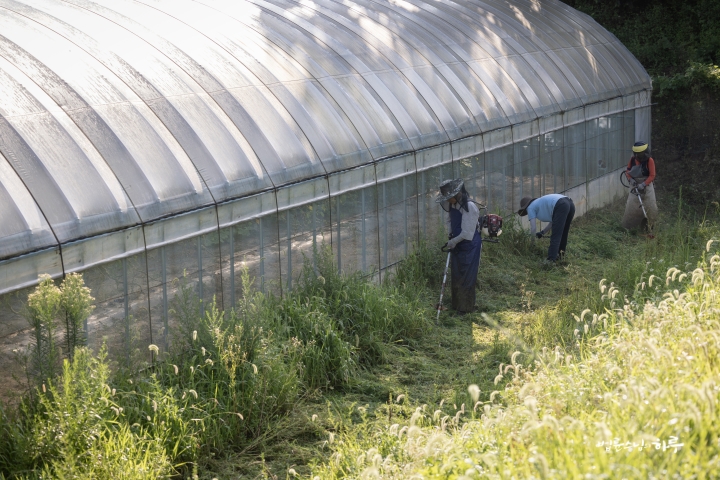
Some of the Dharma teachers planted lettuce in the vegetable garden, made ridges, and tidied up the surroundings.
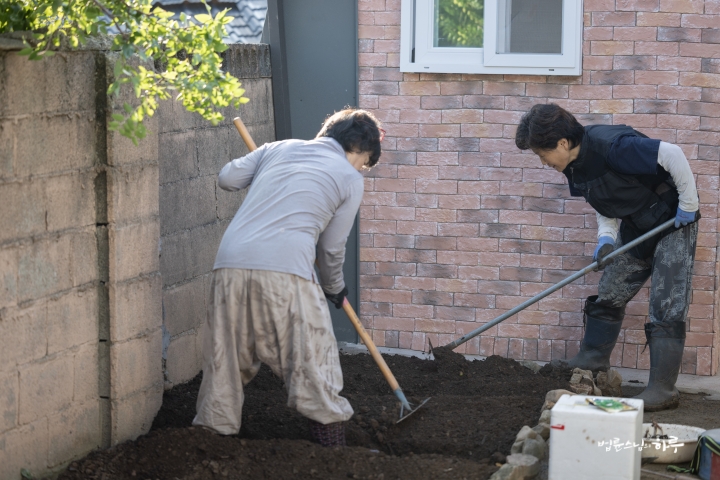
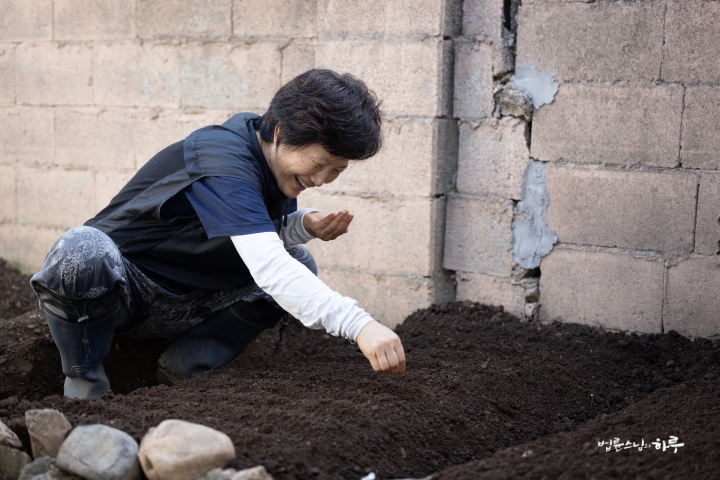

It was almost time for the formal monastic meal. They finished working at 8 AM. When Sunim put down the trimmer, his back and waist were soaked with sweat.
“Now even cutting grass with a trimmer is quite tiring.”
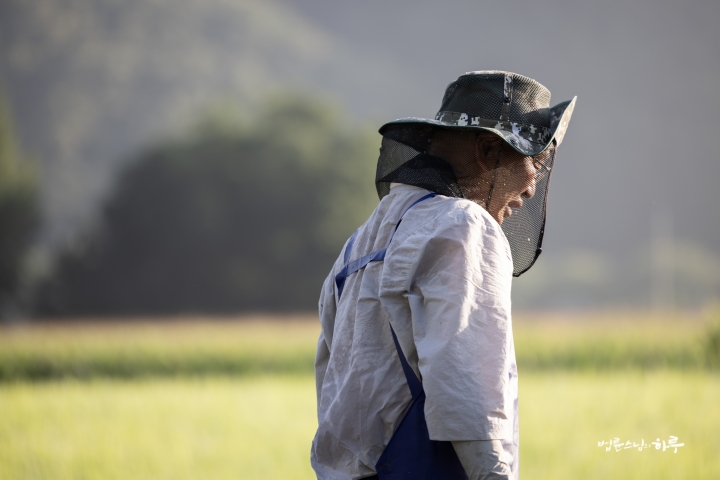
After resting briefly during the hot midday hours, at 1 PM, he held a meeting to prepare for the pilgrimage to India. Sunim discussed the current status of all participants, flight reservations, guiding Dharma teachers, bus operations, and the schedule for orientation and the opening ceremony before concluding the meeting.
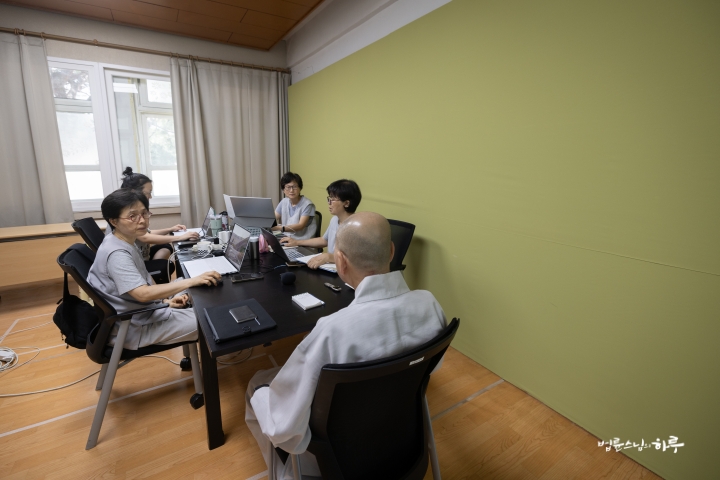
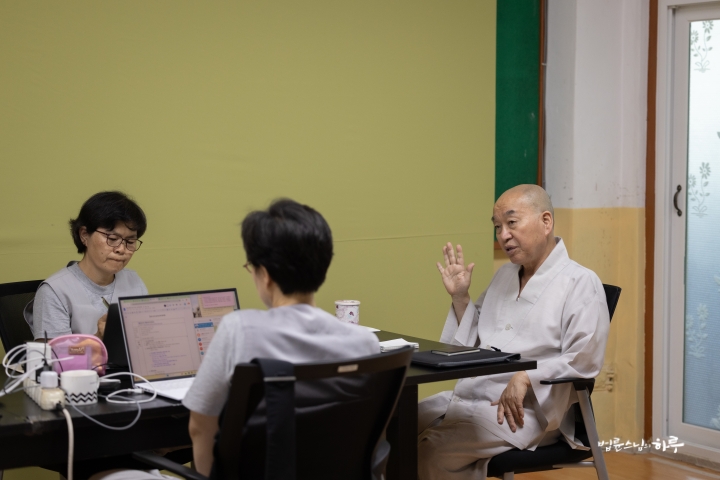
After the meeting, they checked how to proceed with tomorrow’s memorial service for the late Mr. Choi Young-jun. Mr. Choi was Sunim’s older brother in secular life and a person who led the democratization and farmers’ movements in the Ulsan area. Since many guests with connections to the deceased will be visiting Dubuk Retreat Center, they discussed and confirmed with the staff how to prepare meals and conduct the memorial service.
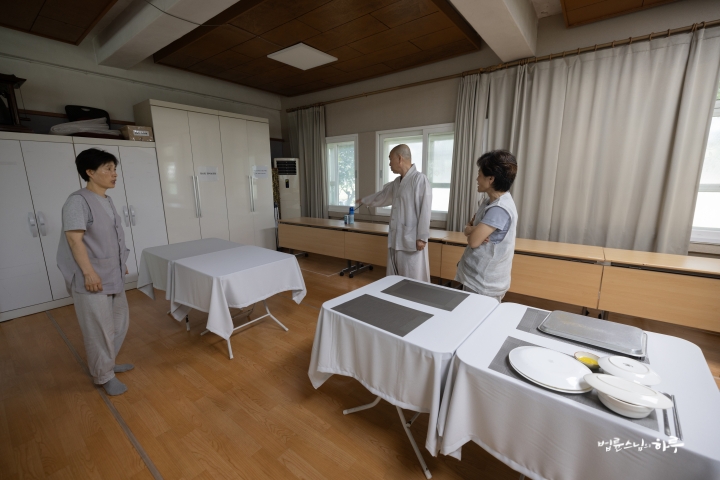
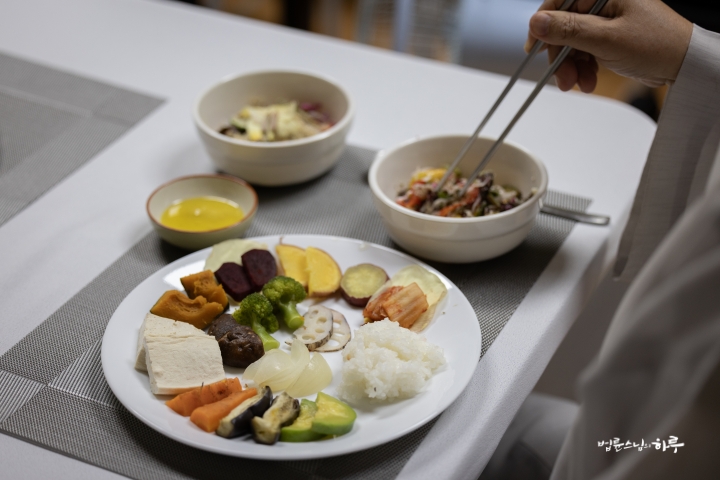
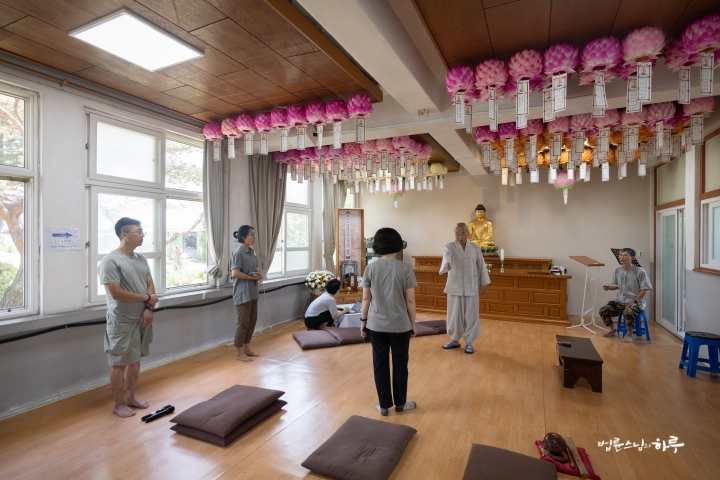
As the sun was too hot, they worked indoors in the afternoon and resumed farm work at 6 PM as the sun began to set.
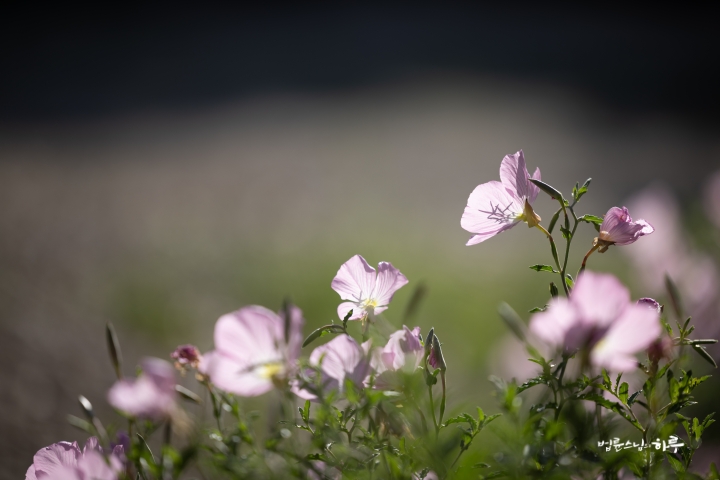
A few Dharma teachers from the community and Haengjas from the practice team also headed to the fields to help with the farm work.

Weeds were growing thickly around the fence of the field in front of the mountain. The village chief had called the farming team to say there were too many weeds, so they decided to pull the weeds first.
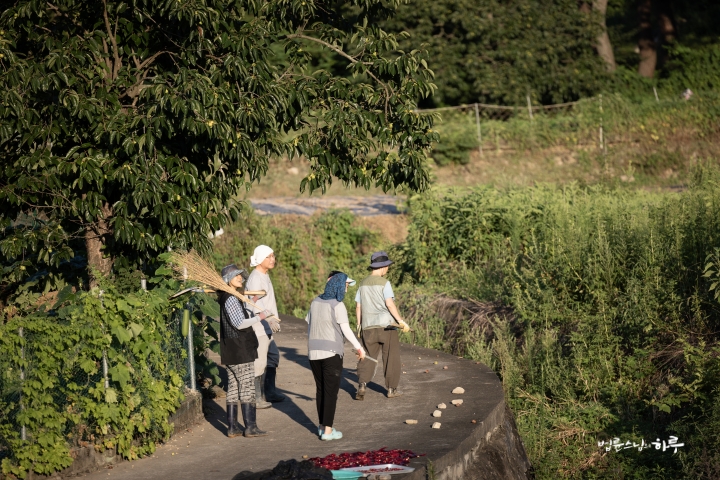
“It’s past 6 PM, but the sun is still hot.”
Although the sun was still blazing, they started working.
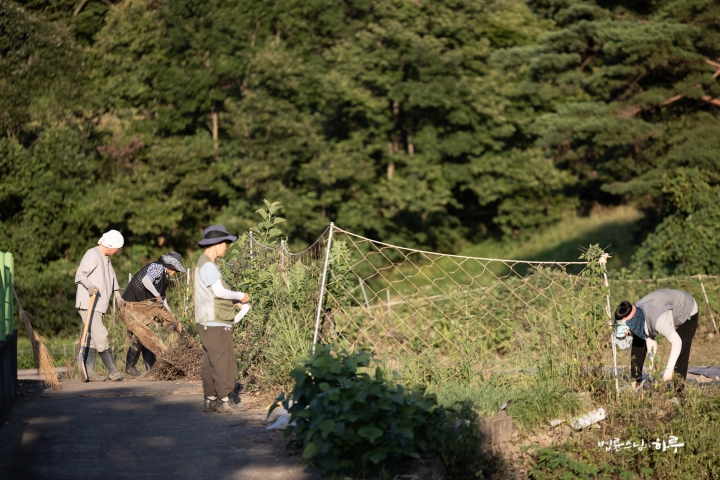
Jerusalem artichokes had taken root along the fence and were entwined in the mesh. They first cut the roots with a sickle and then pulled out the stems entangled in the mesh by hand.
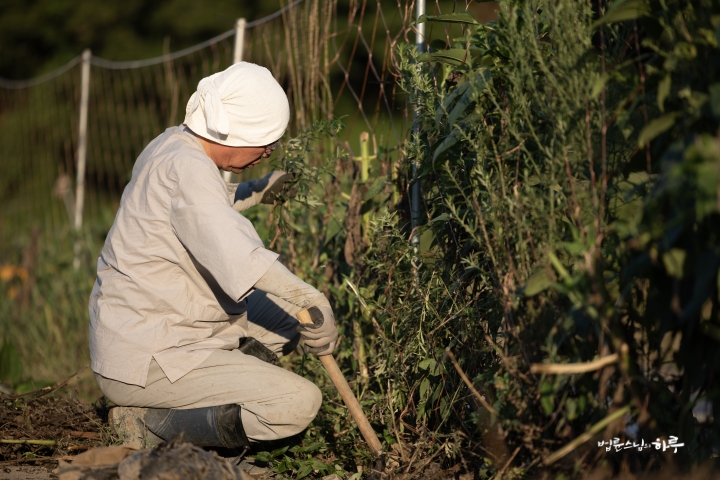
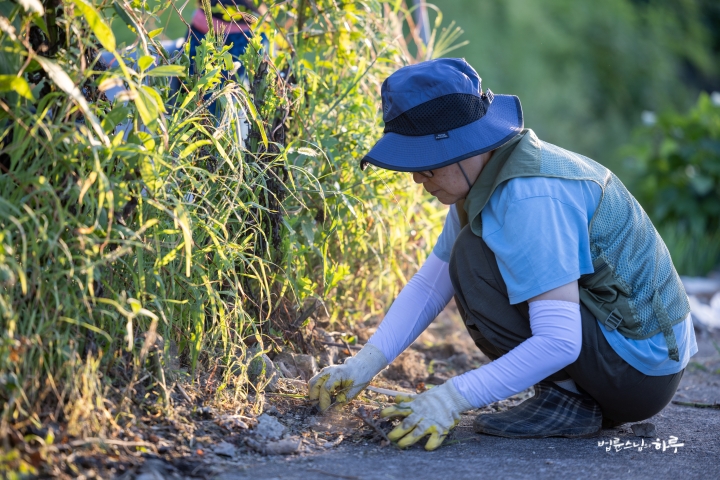
They removed all the plastic entangled in the ground and scraped the soil that had spilled onto the road back into the field with shovels.
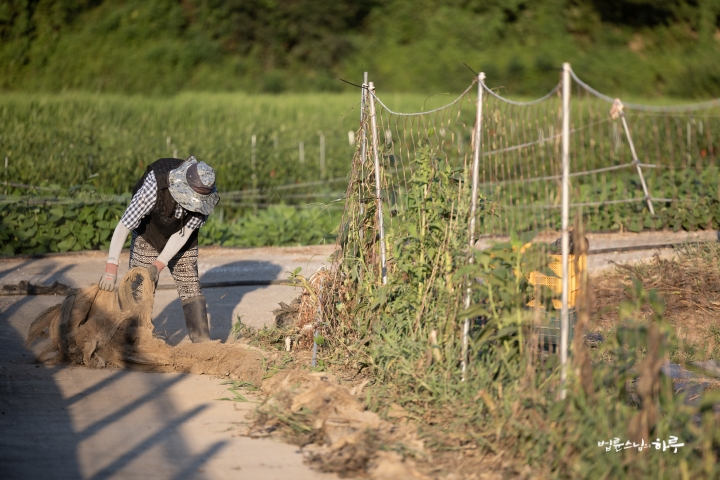
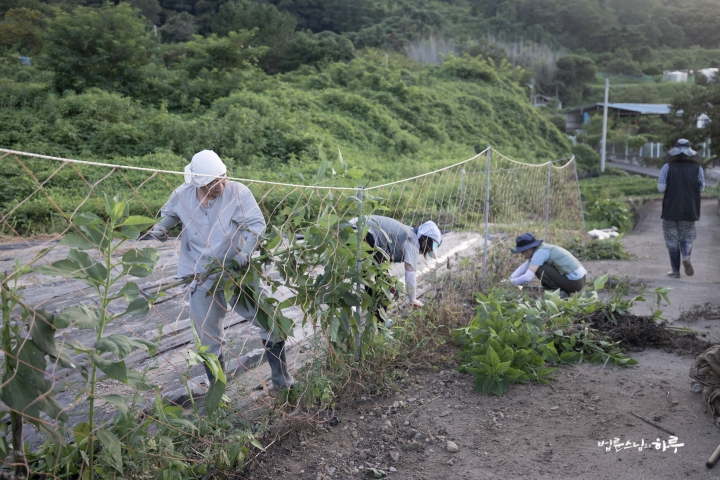
As sweat poured down, the sun began to set, and a cool breeze started to blow.
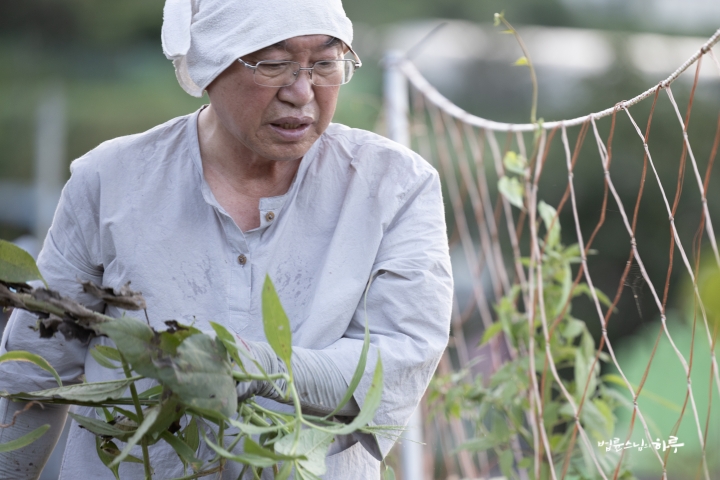
After finishing one side of the fence, they moved to the adjacent side and continued removing weeds.
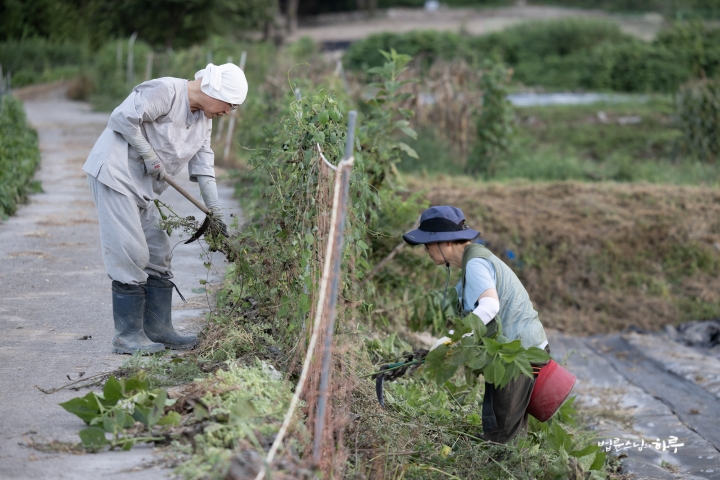
They loaded all the pulled weeds onto a cart and moved them to the compost area. Finally, they swept the road clean with a broom.
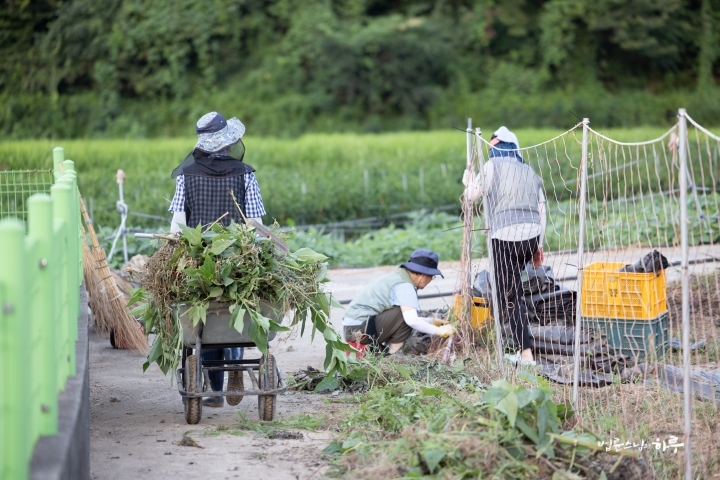
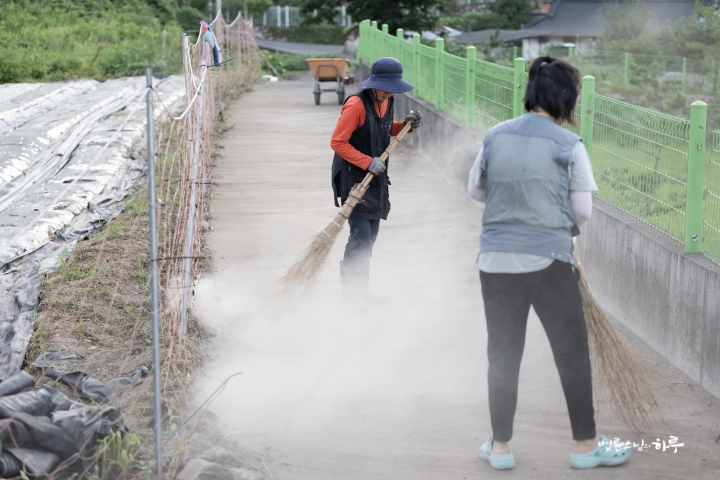
The fence posts had fallen over, so Sunim hammered them back in place.
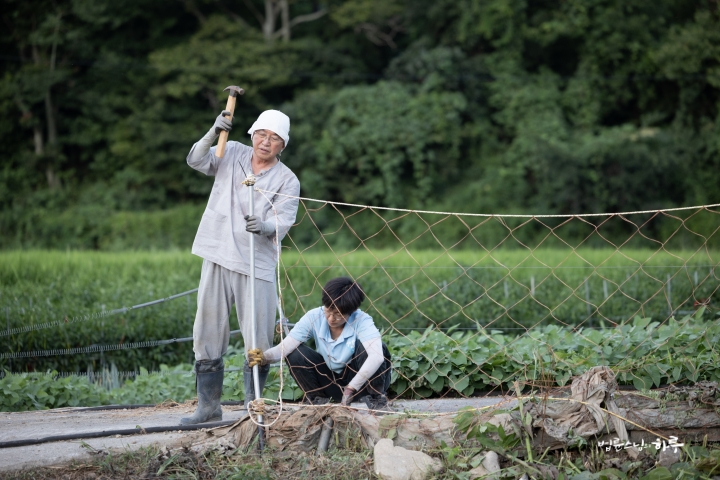
The gate posts used as an entrance were so overgrown with weeds that their shape was unrecognizable. After clearing away the weeds, their original form was revealed.
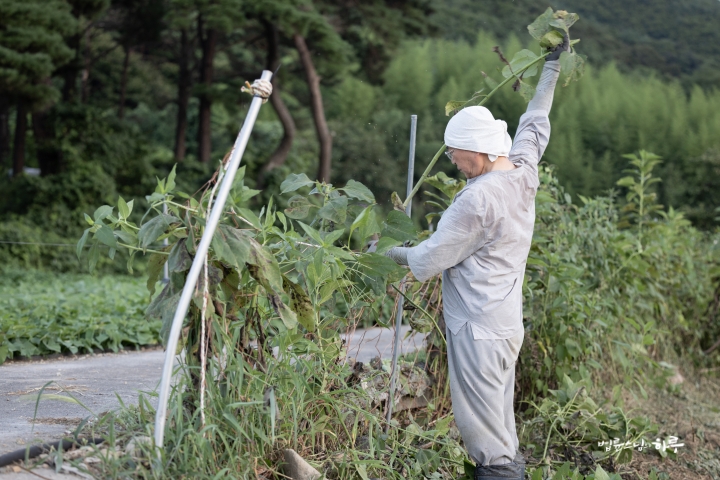
“In the old days, the elders used to call a field like this ‘an ownerless field.’ It looks like something the village elders would say that about.”
After tidying up the surroundings, only the neatly standing fence remained.
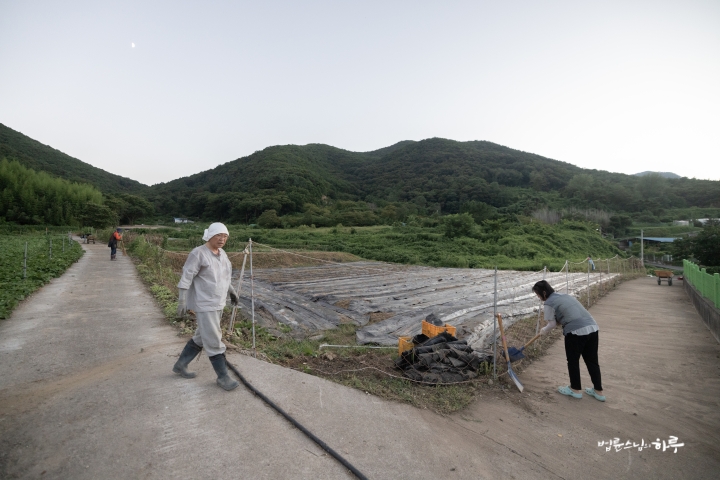
“Now it looks like a field with an owner.”
After finishing with the fence, Sunim carefully examined what other tasks the farming team might have been too busy to attend to. There were still some areas around the greenhouses where the grass trimmer hadn’t been used.
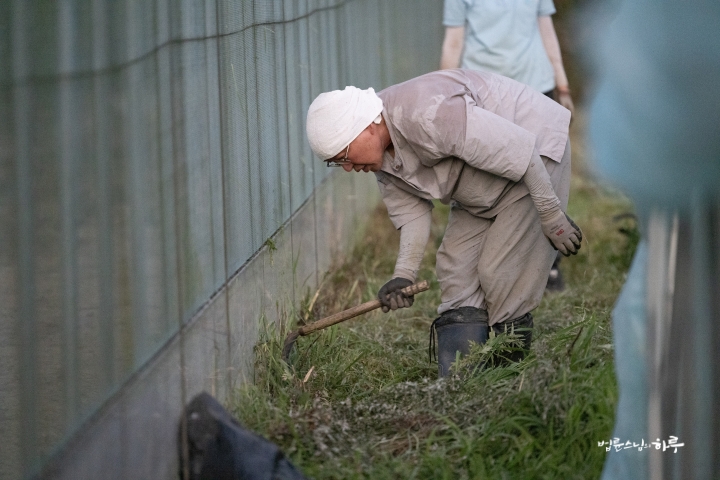
While Dharma teacher Myodang used the trimmer, Sunim cut the grass right next to the greenhouse with a sickle.
As he cut the grass with the sickle, the sun was about to set completely.
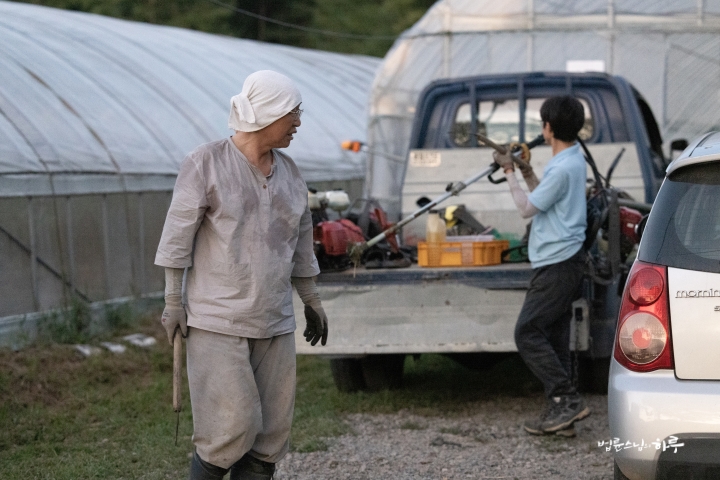
“Let’s stop here for today. Tomorrow, let’s cut all the grass on the paddy ridges with the trimmer. Please prepare the trimmer for use.”
After asking the Haengja to prepare for tomorrow’s work, they finished the farm work. Sunim’s clothes were soaked with sweat as he returned from work.
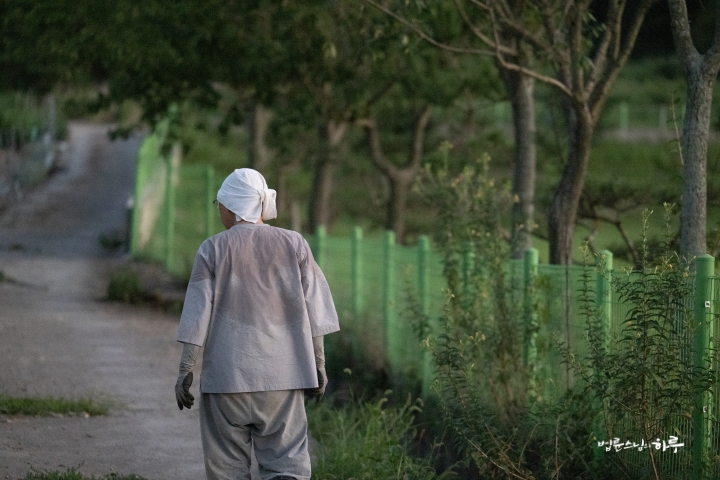
In the evening, he proofread manuscripts before concluding the day’s activities.

As there was no Dharma talk today, this writing will conclude by sharing a conversation between Sunim and a questioner from last week’s Friday Dharma Q&A.
I Broke Up with My Boyfriend Because He Found Marriage Burdensome
There’s nothing wrong with wanting something. However, if you become attached to the idea that what you want must happen, you’ll suffer when it doesn’t. Suffering comes from attachment, which is why we say to let go of that attachment, not that you shouldn’t have desires.
But right now, you’re thinking about how to persuade this man. You want to know how to achieve what you want. However, what I can help you with is not how to achieve what you want. If I were to help with that, I’d have to charge a fee. (Laughter)

That’s why religious organizations often require fees. They say if you pray to God or Buddha, your wishes will come true, but to fulfill those wishes, you need to pay some money upfront. They claim offering money makes it more effective. Similarly, when pursuing any benefit, they say you need to give up part of what you’re seeking. However, what I do is not like that. You need to resolve issues involving personal gain on your own, but I can help with matters that don’t involve seeking benefits. So when asked “How can I get what I want from that man?”, all I can say is “Figure that out yourself.”
If you’ve been getting along well with your boyfriend and want to marry him, but he feels burdened by the idea of marriage, you need to make a choice. If marriage is a must for you, you should let go of this man and find someone else who wants to marry. If you can let go of the idea that you absolutely must get married, you can simply say, “Okay, let’s just remain friends.” Then there’s no problem. However, if he doesn’t even want to be friends, you need to accept his position no matter how much you like him. Just as you would have to give up eating food you really want if it contained poison, you must respect the other person’s wishes if they say no.
In the past, people believed that if you kept pursuing someone even after they said no, your sincerity would eventually get through. The saying “No tree can withstand ten strikes of the axe” reflects this mindset. This Korean proverb suggests that with enough persistence, anyone’s resistance can be overcome, especially in romantic contexts. But culture has changed now. Previously, writing letters, calling daily, or standing in front of someone’s house with flowers was seen as passionate love. Now, these actions are viewed as going against the other person’s will and are considered harassment. They have even become legally prohibited. When something moves beyond a moral issue to being legally banned, it means it’s considered a bad act. In other words, it could be criminal. For example, just as hugging someone without consent because you like them is sexual harassment, continuing to express your feelings when the other person dislikes it can be considered mental harassment and a crime. Even if you love someone, if they don’t like it, it’s harassment. So if the questioner acts this way in today’s world, it would be considered a crime. Therefore, you have no choice but to stop.

Some people still haven’t adapted to these cultural changes. In the past, parents hitting children who didn’t listen was considered education, but now it’s seen as child abuse. Even parents hitting their children is now considered assault and a crime. School teachers using corporal punishment for discipline is now regarded as child abuse. Even yelling is considered mental abuse and included in child abuse. As culture and values have changed like this, we shouldn’t cling to old ways.
Usually, laws follow cultural changes, but sometimes laws precede cultural shifts. As a result, many behaviors that were once commonplace are now considered criminal acts. Korean immigrants to the United States often struggled with this issue. Many had their children taken away for child abuse when they tried to discipline or hit their children. I’m not saying whether this is good or bad. I’m saying times have changed. Older people might think these changes are wrong and that traditional values are being disregarded. On the other hand, younger generations and children might view these changes positively. It can be seen differently from each perspective.
If the questioner understands this properly, the issue will be resolved clearly. Otherwise, regrets will linger. If you liked each other and became friends, but the other person doesn’t want marriage, you need to stop there. If you become greedy, the consequence will be a breakup. If you had agreed to just remain friends out of respect for the other person’s wishes, the relationship could have continued. But because you ignored the other person’s thoughts, you had no choice but to break up. If you’re resolved to just be friends, you can contact them again. It’s not wrong to convey your intentions as long as it’s not forceful.
In your relationship, since you like the other person more, you inevitably become the subordinate party. If your boyfriend called first and asked, “How about we just stay friends?”, you could say, “Okay, let’s just be friends.” But he’s not contacting you. When you like someone more, you inevitably become the subordinate. It’s like when you really need to buy something – you become subordinate to the shop owner. You have to pay whatever they ask. Conversely, if the owner needs to sell quickly, they have to lower the price to what the customer is willing to pay. So if you want to see him, you can call and express your wish to meet as friends. He might say he doesn’t even want to be friends, or he might suspect you’ll ask for marriage again even if you agree to be just friends. That’s why you need to clearly state your intentions.
“Even if our relationship is restored, I won’t propose unless you do. If I really want to get married, I’ll look for someone else then.”
If you say this and the other person still finds even a friendship burdensome, you should also be firm: “Thank you for the good times we’ve had together. Take care.” Express gratitude for the time you’ve spent together and then cut off the relationship cleanly. Don’t end it with resentment by saying something like “We’ll see how well you do.” In human relationships, the other person might call you after a year, or you might call them. So it’s better not to say harsh words in the heat of the moment just because you feel bad.

By expressing your intentions clearly and thoroughly like this, you won’t have regrets even if you break up. If you keep having thoughts like “I should have called then” or “I should have expressed my feelings more actively,” it becomes painful for you. So it’s better for you to say everything you can and then end it if it’s not accepted. When you reject someone, you might feel a bit guilty, but when you’re rejected, you might feel hurt and upset, but it’s actually very good. Because it’s not your fault. How about trying to sort things out this way?”
“After listening to what you’ve said, Sunim, I realized that my thinking was too shallow. I think I’ve come to reflect on how I should act and live from now on. Thank you.”
Tomorrow, Sunim plans to do farm work early in the morning, then conduct a live broadcast of a Dharma assembly, attend a memorial service for the late Mr. Choi Young-jun, and in the afternoon, have a conversation with family and friends who attended the memorial service.
A Day in the Life of Sunim is translated by AI, edited by volunteers




